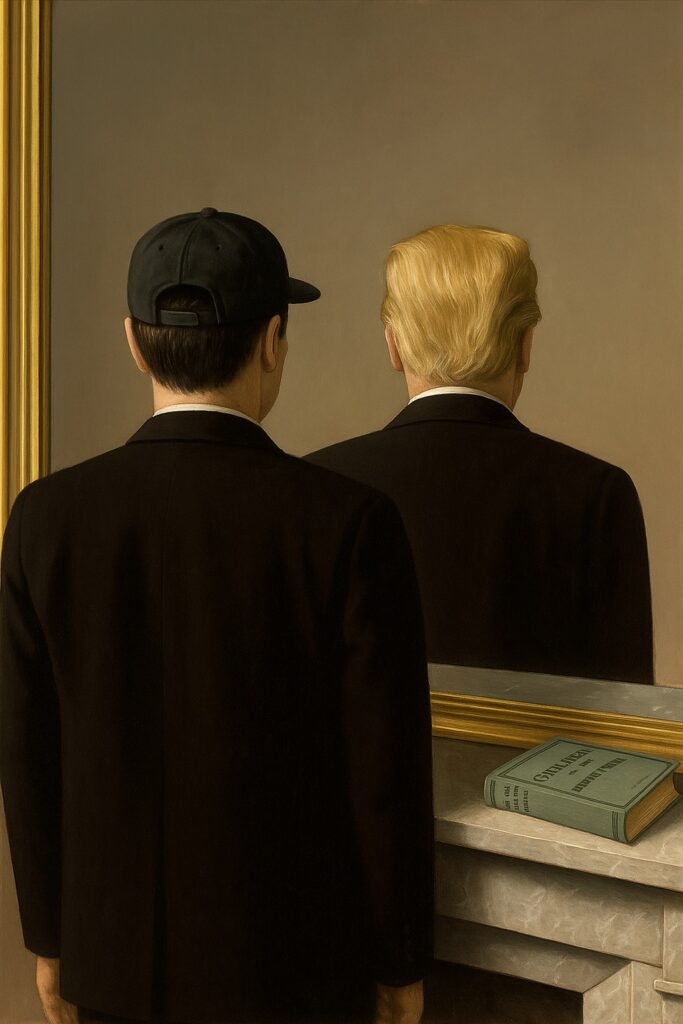
Illustration: Flavia – inspired by Magritte, co-created with the help of AI
Not so long ago, Elon Musk was a major donor to Donald Trump’s presidential campaign. He even joined the newly formed governmental “Department of Efficiency” (DOGE), intended to bring order and clarity to the United States’ public finances.
But when Trump – in contradiction to earlier promises – pushed through the One Big Beautiful Bill Act, which increased the national deficit and cut support for green technologies, Musk reacted sharply. He publicly condemned the bill, calling it “a disgusting abomination,” urged for its rejection, and even – briefly – mentioned the idea of Trump’s impeachment.
Trump struck back, threatening to cancel Tesla and SpaceX contracts. For a moment, it looked like a full-blown media war of the titans.
But was it really about money and power?
Or was there something much deeper pulsing beneath the surface of this clash?
It’s Not About Who’s Right
In a world of headlines, where every confrontation becomes a spectacle, it’s easy to miss what truly matters: the subtle movement of energy unfolding beneath events.
In this sense, the Musk–Trump conflict – inflated by media, full of accusations, disappointments, and dramatic turns – is not just another episode in the political soap opera.
It’s a mirror. A reflection of a collective lesson that’s approaching us – or perhaps already resonating within us.
Because it’s not about who was right.
It’s about where we act from, when we feel the need to “fix” the world.
Blind Enthusiasm
Musk entered the public arena not only as a billionaire or innovator, but as someone who – perhaps earnestly – wanted to bring change. The speed of his mind, his frustration with systemic inertia, his visionary thinking — all resonate with the archetype of the collective hero, the pioneer.
But even the best intentions, when they arise from unseen, unprocessed patterns, can lead not to breakthrough, but to breakdown.
The Field does not respond to what we declare — it responds to the quality of vibration we truly carry. And action driven by unresolved grief, unfulfilled ambition, or a compulsion to “rescue” the world… that all lingers in the Field and echoes back. Sometimes forcefully. Sometimes painfully.
Striving Without Rhythm
In our collective history, we still carry a deep imprint: push further, cross the limits, act no matter what.
It’s the old song of progress — and a powerful trap.
Because when action becomes compulsion rather than a natural flow from inner stillness, it doesn’t bring true transformation. It only creates a new level of exhaustion, disappointment, burnout.
And sometimes, yet another attempt to control the world in the name of the greater good.
Sound familiar?
Polarization as a Mirror of Our Own Fragmentation
Trump and Musk – whatever we may think of them – embody two poles of energy that live within us all:
– the need for control and dominance,
– and the drive to break boundaries and change systems from within.
When we reject either of them — we sever part of our own energy.
And that’s why it’s so easy to fall into judgment, stories of betrayal, disappointment, blame.
But the Living Field knows no blame.
It only recognizes the truth of resonance.
And if something is pulsing loudly today — it’s the call for a new kind of action, not born of polarity, but of balance.
Not from the impulse “I must do something,” but from the quiet presence that says,
“I am willing to be with what is — before I choose how to move.”
The End of the Patriarchal Era
Perhaps that’s why we’re witnessing the unraveling of so many old alliances and systems.
We’re nearing the end of an age defined by domination, fear of failure, overexertion, and the belief that value is measured only in effectiveness.
These are the imprints of the Patriarchal Era — a long cycle that is now gradually dissolving.
It was not a “bad” time.
But it was an era shaped by the overuse of masculine force, binary thinking, and a disconnection from the subtle guidance of the Field.
It’s time to stop fighting.
Time to learn how to co-exist tenderly with what is unfolding — and to act from a place of wholeness.
Everything Can Be a Teacher
Conflict isn’t always failure.
Sometimes it’s a mirror placed in our path — to slow us down long enough to see that our old ways of moving no longer resonate.
This doesn’t mean we should stop acting.
It means that before we act, we are called to root ourselves in inner equilibrium.
To return to our center.
To the Field.
To that place within us that no longer needs to win —
but simply longs to live in truth.
We’re not here to determine who’s right.
Nor to withdraw from the world.
The Living Field invites us to something more subtle:
an inner movement that sees reality as it is — without losing the tenderness of perception.
Perhaps it is in moments like this — when old patterns shake and fracture – that we’re invited to ask different questions than the ones conflict usually offers.
Questions that don’t seek answers, but invite a deeper sensing:
— Is what moves in me rooted in trust — or in urgency?
— Does my desire to change the world arise from the body — or from fear?
— Can I stay with what is, without choosing sides — and still act in alignment with the deeper order?
We don’t need immediate answers.
Sometimes, simply asking the right question in the right place opens the way for a gentle shift.
And maybe that’s how a new era begins —
not with noise or drama,
but with a quiet choice to see more clearly.
To no longer act against myself, even when the world shouts.
To choose resonance with the Field.
Even amidst chaos.
Perhaps especially amidst chaos.
